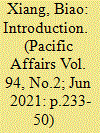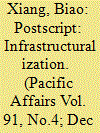|
|
|
Sort Order |
|
|
|
Items / Page
|
|
|
|
|
|
|
| Srl | Item |
| 1 |
ID:
187177


|
|
|
|
|
| Summary/Abstract |
The pandemic has ushered in drastic new restrictions on the right to move, as governments have imposed lockdowns in more or less organized ways. In pursuit of its zero-COVID policy, China has gone farther than most in the extent and rigor of its mobility restrictions. Responsibility for enforcement has been redistributed to lower-level officials, landlords, and migrant labor agencies, while food delivery companies and others in the mobility business have thrived. These redistributions of mobility are likely to remain in place beyond the pandemic, changing relations between government and citizens.
|
|
|
|
|
|
|
|
|
|
|
|
|
|
|
|
| 2 |
ID:
178751


|
|
|
|
|
| Summary/Abstract |
“Suspension” is the translation of the Chinese term xuanfu, which has been widely used in public discussions in China since the mid-2010s. Suspension indicates a state of being in which people move frequently, conduct intensive labour, and pause routine life—in order to benefit fast and then quickly escape. People keep moving, with no end in sight, instead of changing their current conditions, of which they disapprove. As a result, frantic entrepreneurial energy coexists with political resignation. Suspension is a life strategy, a multitude of experiences, a feeling—and now, a keyword: a crystallized consciousness with which the public problematize their experiences. This special issue develops this term into an analytical approach based on ethnographic research involving labour migrants in and from China. This approach turns migration into a basis for critical analyses on issues far beyond it; enables co-research between researchers, migrants, and the broader public; and seeks to cultivate agency for change among actors. This introductory essay, based on the author’s long-term field research and public engagement, outlines why we need such an approach, and how we might develop it.
|
|
|
|
|
|
|
|
|
|
|
|
|
|
|
|
| 3 |
ID:
110224


|
|
|
|
|
| Publication |
2012.
|
| Summary/Abstract |
This special issue takes the migrant broker as a starting point for investigating contemporary regimes of transnational migration across Asia. The articles, which span large parts of Asia-including China, Indonesia, Laos, Malaysia, Singapore, South Korea, Thailand, Vietnam, as well as New Zealand-show that marriage migration, student migration and various forms of unskilled labour migration, including predominantly male plantation and construction work and female domestic, entertainment and sex work, are all mediated by brokers. Although much is known about why migrants leave home and what happens to them upon arrival, considerably less is known about the forms of infrastructure that condition their mobility. A focus on brokers is one productive way of opening this "black box" of migration research. The articles in this issue are thus not primarily concerned with the experiences of migrants or in mapping migrant networks per se, but rather in considering how mobility is made possible and organized by brokers, most notably in the process of recruitment and documentation. Drawing from this evidence, we argue that in contrast to the social network approach, a focus on the migrant broker offers a critical methodological vantage point from which to consider the shifting logic of contemporary migration across Asia. In particular, paying ethnographic attention to brokers illuminates the broader infrastructure that makes mobility possible while revealing that distinctions between state and market, between formal and informal, and between altruistic and profit-oriented networks are impossible to sustain in practice.
|
|
|
|
|
|
|
|
|
|
|
|
|
|
|
|
| 4 |
ID:
163836


|
|
|
|
|
| Summary/Abstract |
This article explores the trend of “infrastructuralization” in state-sponsored programs of low- and semi-skilled labour migration from Asia. These programs increasingly focus on facilitating migration rather than generating actual opportunities for mobility and substantive development. While providing training to develop skills targeting specific jobs in specific countries, the programs generally leave complaints about actual working conditions and wages to be managed by the migrants themselves. In this process, labour migration programs are infrastructuralized, meaning that there is an ongoing expansion and intensification of the socio-technical platform that makes mobility possible, as facilitation becomes an end in itself. This trend is tied to changes in the general development paradigm, labour and state-citizen relations across Asia, as well as the increasing importance of brokers in facilitating connection. This article first probes a number of internal dynamics around which infrastructuralization unfolds in practice. We then highlight how commercial intermediaries and public institutions, the two key actors in infrastructuralization, shape migration by producing context-specific migrant subjectivities, making aspirational work a central element of infrastructuralization. In the conclusion, we explore research agendas that can be developed further.
|
|
|
|
|
|
|
|
|
|
|
|
|
|
|
|
| 5 |
ID:
110226


|
|
|
|
|
| Publication |
2012.
|
| Summary/Abstract |
Private recruitment agents have been a major concern of policy makers in international labour migration. The agents are seen to undermine state authority, the market order and migrant rights. It is commonly suggested that their role can be curtailed or even eliminated if the administrative red tape of migration control is cut down (a liberal approach), or regulation on the intermediary business is tightened up (an interventionist approach). The Chinese government has done both at different times since the 1980s, but only to make the process of recruitment more complicated and private agents more powerful. This paper explains why. Based on a period of seven years of field research and documentary study, the article provides an ethnographic account of the change of the practice of international labour recruitment in China, especially in relation to systemic reforms, between 1980 and 2008. The centralized state in a liberalizing economy seems to need private agents in order to render individual mobility governable, migrants protectable and agents themselves "blamable" and punishable. If limited centralization of state power gave rise to earlier intermediary forms (e.g., tax farming), intermediary agents today result from governmental practices of the highly centralized state. As such, private agents should not be construed as autonomous entities located between demand and supply, or between migrants and states; they are instead an integral part of a complex structure of governance.
|
|
|
|
|
|
|
|
|
|
|
|
|
|
|
|
| 6 |
ID:
191663


|
|
|
|
|
| Summary/Abstract |
The COVID-19 pandemic and interventions addressing it raise important questions about human mobility that have geopolitical implications. This forum uses mobility and immobility during the pandemic as lenses onto the ways that routinised state power reacts to acute uncertainties, as well as how these reactions impact politics and societies. Specifically, we propose the concept of “shock mobility” as migratory routines radically reconfigured: emergency flights from epicentres, mass repatriations, lockdowns, quarantines. Patterns of shock mobility and immobility are not new categories of movement, but rather are significant alterations to the timing, duration, intensity, and relations among existing movements. Many of these alterations have been induced by governments’ reactions to the pandemic in both migrant-sending and receiving contexts, which can be especially consequential for migrants in and from the Global South. Our interventions explore these processes by highlighting experiences of Afghans and Kurds along Iran’s borders, Western Africans in Europe, Filipino workers, irregular Bangladeshis in Qatar, Central Americans travelling northwards via Mexico, and rural-urban migrants in India. In total, we argue that tracing shocks’ dynamics in a comparative manner provides an analytical means for assessing the long-term implications of the pandemic, building theories about how and why any particular post-crisis world emerges as it does, and paving the way for future empirical work.
|
|
|
|
|
|
|
|
|
|
|
|
|
|
|
|
|
|
|
|
|